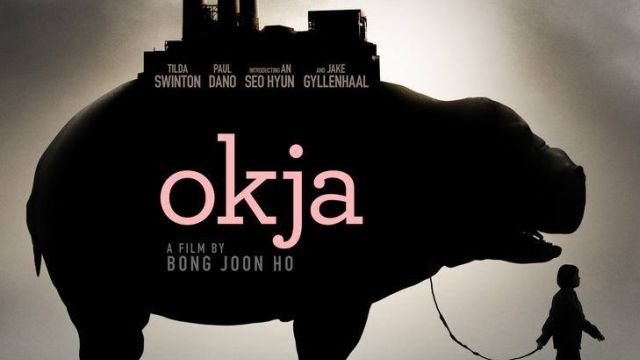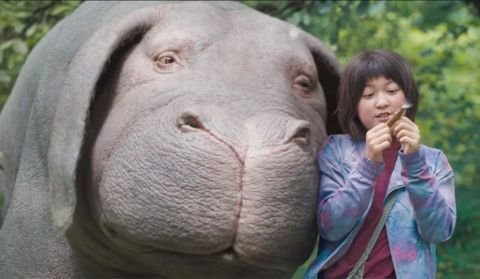"Animals are my friends and I do not eat my friends." St. Francis of Assisi.
After all the stir caused in Cannes, the film of Netflix Okja made its debut in the famous online platform. Bon Joon-ho presents us with blunt satire on meat companies, ruthless animal abuse, and an attempt to add members to the ranks of vegetarianism.

A fable with fantastic elements, with a tone and style that approaches the Wes Anderson cinema (for its well-marked and colorful characters) and Spielberg (with its magic and children protagonists), in 2007 the Mirando corporation prepares, with the daughter of owner who founded it, a reality show to choose the best super pig, among some that have been genetically modified to be as great as appetizing. They select 26 of these mammals that will be sent to different breeders around the world and ten years later they will choose the best, which will be taken to New York for presentation. The cruel intention is to maintain their clientele by selling them the idea of the best products on the market and without GMOs. Consumers devouring, demanding and eccentric who ignore at will that behind the tiny sausage they eat, there is a cruel process of breeding and industrial preparation.
One of those breeders is Mija, a young girl who has made Okja her best friend in the remote and colorful mountains of her village. When the agreed time is fulfilled, to his house arrives the show of the corporation to announce that the piglet has been selected like the best one and must return to them. Mija's grandfather had hidden the reality behind his pet and now must undertake a long and dangerous journey to retrieve it.

Bon Joon-Ho presents a story that gives sweet moments to the little girl and her best friend, but also bitter to awaken her in the raw reality that she must discover and confront. We become accomplices of their tender mischief and guilty because ultimately many are consumers of flesh and therefore guilty of omission of mistreatment exercised by unscrupulous companies, an truth in voices that we all recognize, but we do not act.
Okja is a satire that keeps its characters to the edge of the caricature, in a dangerous line that at times weighs on the film, but that given its movement and the fanciful elements do not allow it to fall. That component of unreality (which we can not forget) saves the film from its exaggerations and a certain sense of strangeness. The characters do not reach the sympathy of Wes Anderson, nor does the story achieve the climax and excitement of Spielberg's.
The director's criticism of meat companies is overwhelming beyond the "decorations" as is a bold attempt to convene new vegetarians in their ranks. In that possible world that Joon-Ho has built, the film's efforts are bittersweet and contrary to what we see in real life, but it is clear that we intend to end it with a "happy ending". Here we return to excuse it because in the universe of fantasies, its lightness is perfectly possible. Its end is of deep beauty and pain.
Tilda Swinton, who plays two roles, Paul Dano and Jake Gyllenhaal have very well read performances, but they are not the essence of this film.
Okja was a very risky bet from Cannes, not only because it was a production of Netflix and it's distribution wouldn't going through movie theaters, but for its style. Okja did not win the Palme d'Or because it's not for that level. The film is visually very well done, with a production design, cinematography and incredible effects, which make it enjoyable on the big screen. It would be interesting to see how it would behave in countries where it was available in both options and finally it was the public who decided how to view it and not that the distributors are those who end up imposing their own tastes and interests.
I recommend you watch this movie. Please vote & comment!
Regards, Antonio.